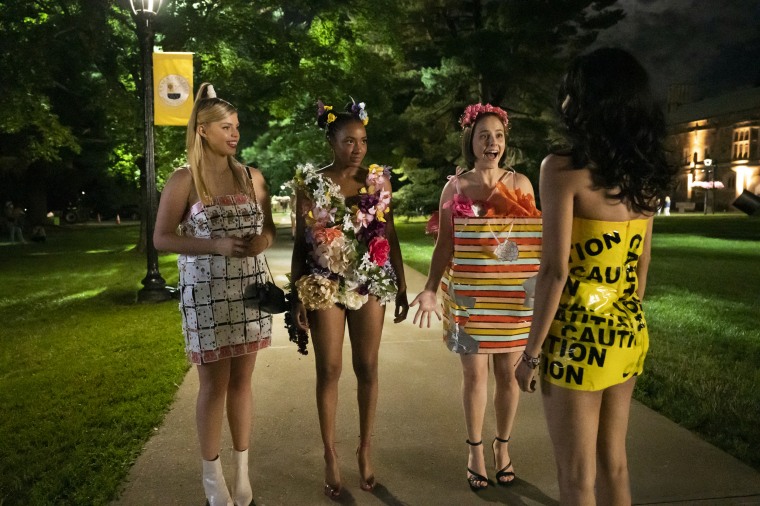HBO Max’s “The Sex Lives of College Girls,” which released its final two episodes of the season Thursday, is devoted to exploring exactly what its name suggests. The series follows the lives of four girls at the fictional Essex College, a small East Coast private school that bears many parallels to the Ivy League alma maters of show creators Mindy Kaling and Justin Noble, as they dive into the raunchiest aspects of college life: naked parties, one-night stands and Tinder hookups.
College — especially randomized roommate assignments — is one of the few places where people are truly forced to mix.
However, viewers will find that while the stars may be bold, they are also often clumsy, inexperienced and awkward; these are still the adventures of young adults. Much of the comedy is fueled by details of the girls’ sexual exploits, as one of the girls has an affair with her soccer coach, another explores her attraction to women, and the two others quickly find hookups. When sex is portrayed, it’s often some sort of “first time” for the character, who experiences feelings from the fluttery and the delicate to the audacious and the empowering.
But the show neglects to take that boldness-faces-bruising-reality-check spirit with the arguably more important platonic relationships between its female stars. The girls have conflicts with boys, in class, with administrators, in their clubs — everywhere besides with one another. As a result, the relationships don’t feel real, with their generally peppy group spirit leaving them less fleshed-out and unidimensional.
Which is a shame, because the college experience of meeting and living with people who are different from you is a really transformative dynamic largely unexplored onscreen. When the show does lean into uncomfortable moments related to the different backgrounds of the leads, it pays off. One of the best scenes comes when the four roommates take their parents out to dinner. The restaurant is affordable to all but one of the girls. The ensuing back and forth and exchange of glances reflect the awkwardness of living with strangers that college provides, an awkwardness that’s one of the most fascinating things you can explore with an ensemble cast.
College — especially randomized roommate assignments — is one of the few places where people are truly forced to mix. But “The Sex Lives of College Girls” only scratches the surface of that potential. College could be the only time when you live day in and day out with people whose lifestyles and upbringings don’t match yours. A show in this setting has the potential to challenge narratives about how we understand one another, and the best way to do it would be with thoughtful, engaging discussions between its leads. Instead, discussions around controversial topics happen haphazardly or get wrapped up in neat, cookie-cutter packages. The moral grays of life are ignored, despite the fact the morally gray conversations are the ones most of us need to have.
The cast includes Leighton (Reneé Rapp), a wealthy, somewhat bratty girl who grew attending New York private schools; Whitney (Alyah Chanelle Scott), a soccer star navigating life as the daughter of a senator; Kimberly (Pauline Chalamet), a small-town girl paying for school through financial aid and work study; and Bela (Amrit Kaur), who, like Kaling herself, is a bright aspiring comedian.
A big part of the show is that it portrays these girls — random college roommates with vastly different personalities and backgrounds — coming together just as on a real college campus. This could have been an opportunity for all sorts of unexpected exchanges. Instead, they go mostly unexplored, papered over or used as punchlines rather than dialogue.
Leighton, for instance, is somewhat mean to her roommates early on. She then buys them off with iPads to make it up to them — and it does the trick instead of serve as a springboard to a conversation about buying friendship or throwing around cash. Instead, it’s her volunteer work that makes her more self-aware.
Kimberly, who is white, is similarly obtuse when it comes to race. In one scene, she expresses her excitement at finally making a “Black friend” to another character. In another scene, Whitney, who is Black, sees Kimberly wearing a dashiki as she prepares to meet a cultural group. The issue is quickly glossed over, however, with a (somewhat unconvincing) joke.
Indeed, there’s a lot of glossing over of serious topics on the show. The series will touch on major issues only to rarely, if ever, bring them up again — Whitney takes on the disparity between male and female athletes for a brief moment; students protesting student debt serve as material for a one-liner. You can’t help but wonder whether the show is tossing away some of its most interesting material.
Being in college means living with new types of people, and that experience is oftentimes surprising, weird and all sorts of other things. Not fully plumbing these depths is a lost opportunity, because there aren’t nearly as many shows about college life as there are high school life, though admittedly “The Sex Lives of College Girls” might still be finding its footing and could explore these horizons more fully next season.
IndieWire says the show feels more like a "workplace comedy" of adults than a coming-of-age story about coeds, and while the publication might mean it as a positive, that artistic choice takes away from some of the complexities the show could otherwise present about its characters, their relationships and modern society. A show that is fueled by laughs while rarely examining what lies beneath the surface misses what’s so messy — and great — about the college years.


